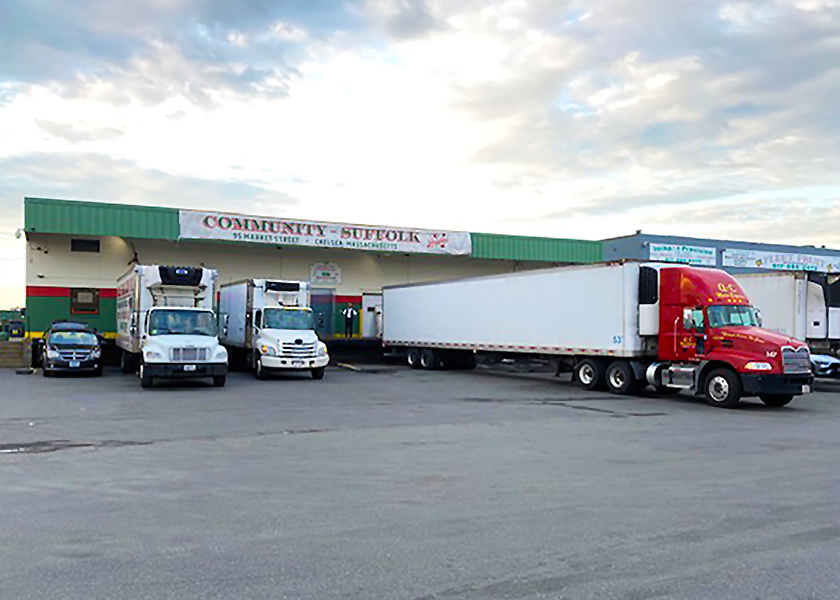What Boston produce distributors expect for fall

Business seems to be going strong for most produce distributors in the Boston area this summer, and they say it’s likely to get even stronger as fall approaches.
Summer is a busy time of year for Peter Condakes Co. Inc. at the New England Produce Center, Chelsea, Mass., said company President Peter John Condakes.
Condakes said he expected solid sales to continue into mid-fall and throughout the holidays before slowing a bit from mid-January through mid-March.
In August, the company was receiving locally grown products including cucumbers, zucchini, summer squash, tomatoes and bell peppers from growing areas like Connecticut, Rhode Island, New Hampshire and Maine.
New England corn, a popular summertime item, typically arrives the first part of August and should be available for six to eight weeks.
“People really look forward to having locally grown corn,” Condakes said. “Native corn and native tomatoes are the two most-awaited items in the grocery stores.”
Persimmons and pomegranates will arrive later, he said, and asparagus is now a year-round item.
Up to 65% of the company’s business is with foodservice customers.
“It seems to be going reasonably well,” he said.
Business also is going well for Chelsea-based Community-Suffolk Inc., said Steven Piazza, managing partner.
“We’ve bounced back from COVID extremely well,” he said. “Business is as good as it’s ever been, or even better.”
Piazza said restaurant business has recovered from COVID-19 and could be even better if eateries could secure all the servers they need.
“Every restaurant has help wanted signs out,” he said.
The company offers a wide selection of items year-round, including celery, broccoli, potatoes, onions and carrots.
Its service area includes Quebec and Ontario as well as Massachusetts and the Eastern Seaboard, from Connecticut northward.
The company moved into a newly remodeled facility between the old Boston Terminal Market location and the New England Produce Center three years ago after the terminal market site was sold.
The 12,000-square-foot location has more vertical racking system than its previous facility, which was built in the 1960s, so it can accommodate more product.
“It’s proving to be extremely efficient and effective,” Piazza said.
August is typically a relatively slow month at Coosemans Boston Inc. at the New England Produce Center, but salesman Chris Kirby said he expects sales to pick up as kids return to school and the fall and winter holidays approach.
Foodservice accounts for a good portion of Coosemans’ business, and that category seems to be doing well, he said.
“I think the restaurants are back in full swing after the COVID letdown,” he said. “Now everyone is back to eating in restaurants; it seems like business as usual.”
Related: Summer sales strong in Michigan
Coosemans serves most of New England and even has a few customers in New York, he said.
The company focuses on specialty items like snipped green beans, hydroponic Boston lettuce, microgreens, jicama, celery root, tomatillos, and greenhouse, cluster and beefsteak tomatoes.
Inflation impact
Like their counterparts throughout the U.S., Boston distributors have had to deal with rampant inflation.
Piazza of Community-Suffolk said inflation has boosted the cost of pallets, boxes and even the cost of labor.
“Prices have gone up substantially in the past 18 months, and nothing is showing signs of coming down,” he said.
The increases have slowed somewhat, but he said costs have “gone to a new level.”
“Every part of the process costs more money nowadays,” he said. “We’re fortunate that we have tremendous support from all the major chain stores in the New England market.”
Fortunately, inflation has not affected sales of the company’s products, most of which Piazza considers staples.
“Potatoes, carrots and onions are in pretty much everybody’s pantry at home,” he said. “They would be one of the last things [consumers] would give up. They’re not really a luxury.”
Inflation is subsiding in some categories, but prices remain high, Condakes of Peter Condakes Co. said.
“Some of my materials that skyrocketed 60% to 80% have come down 20% from their highs,” he said. “But they’re still much higher than they were before.”
Labor costs account for many of the cost increases in the agriculture business, he said.
In the past five years, the minimum wage in Massachusetts rose from $11 to $15 per hour, he said.
Even the cost of utilities has gone up.
“Electricity is wildly higher,” he said, adding that the cost of power might come down if natural gas prices decline.
“The last time they set rates in the Boston area, the cost of natural gas was high, and a lot of our electricity is produced with natural gas,” he said.
Inflation has not had an effect on the company’s sales, he said.
“I haven’t noticed it overtly at all,” Condakes said. “You hope that people keep consuming what we sell because it’s good for their health.”
Inflation doesn’t seem to have dented sales at Coosemans either, even though its product line emphasizes relatively pricey specialty items, Kirby said.
“People still have to eat,” he said. “I don’t think people are cutting back [on produce] too much.”







